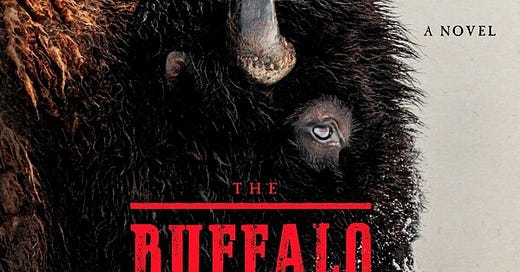Our narrator is a Lutheran pastor, living in Montana in 1912, soon enough after the colonization of the American West that he still gives Sunday services in German for the sake of all the new immigrants from that country. A stranger starts showing up to Sunday services, sitting in the back. He’s “an Indian gentleman,” who intently watches the pastor’s face during the sermon and then stays after the parishioners have gone. His name is Good Stab. He wants to make a confession. And he needs the pastor to snuff out all the candles, please, because the light hurts his eyes.
“I don’t expect you to believe my story at first,” Good Stab says.
“I’ve earned this white hair,” the pastor says back to him. “I’ve heard a lot in my time, Good Stab, if I can call you that. Pastors are hard to surprise.”
I realized, when I read these lines, that this book was going to be an interview with the vampire. And I got very excited. Did you ever see the movie, with Christian Slater in the role of the interviewer? I read the book too, but it’s the movie I remember, in which Christian Slater is so seduced by the story Brad Pitt tells him that he ignores both the suffering the vampire has described and the threat to his own life.
This book is not a seductive vampire story. It is gross. Interview with the Vampire was provocative enough that Oprah walked out of a screening to pray in the hallway.1 The Buffalo Hunter Hunter is far worse. Jones’s philosophy of rising dramatic action seems to include raising the physical stakes to be more and more gratuitously disgusting.
Good Stab’s confession is happening in the long aftermath of a massacre. Representatives of the U.S. Federal government ambushed a Blackfeet encampment in 1870 and murdered 173 people, mostly women and children.2 They were already dispossessed of their lands, freezing and starving and suffering from smallpox. Army troops killed the leader first, a chief named Heavy Runner, breaking an agreement that had promised his safety and the safety of his band.
This massacre is key to Jones’s story, as is a recurring image of dead bison, entire herds of them killed and skinned by white profiteers who take only the hides, leaving the valuable meat behind. The carcasses are covered in poison, and the indigenous people who rely on the herds are starving. This is both a get rich quick scheme and a deliberate policy to destroy the natives.
The Buffalo Hunter Hunter is a book that grieves, intensely, for the severance of an entire people from the land and animals with which they are intertwined. And Good Stab the vampire, a lonely outcast, wants revenge.
When I read Mariana Enriquez’s Our Share of Night, I was put off initially by what seemed like gratuitous violence and gore. And then the book connected its supernatural horror with the murders and disappearances of Argentina’s Dirty War, and suddenly the book’s demons seemed like an appropriate expression of the real horror of its setting. Enriquez has said that horror is the right genre for Latin American writers right now, as writers across different countries from the region grapple with real world violence.
Jones, a prolific horror writer whose protagonists are Blackfeet, usually in the modern day, is doing something similar. I mean, I don’t think he sat down and calmly considered the real historical Marias River Massacre and then decided that horror was the right approach. I think he loves horror and gore, and is a writer whose genre interests create an alchemical reaction with his subject matter. Horror fiction can be an appropriate response to the real world.
At least, that’s how I remember it. I can find sources online that say she walked out of the screening, but not the part about praying.
This is the number Jones apparently settled on. Wikipedia gives a range of 173 to 217. Inside the book, Jones says 173 people were killed, but The Buffalo Hunter Hunter’s jacket copy says 217.




Thanks for this rec--adding to my list. I read The Only Good Indians and wanted more horrifying/haunting elements; sounds like Jones's latest delivers in that respect. Loved Our Share of Night and think Enriquez is an amazing writer--will read anything she writes! Fernanda Melchor's Hurricane Season was good, but too much sex for my taste. It's gotta be juuuuuust right. =)
I'm listening to audiobooks of the Indian Lake trilogy right now. I liked the first one a lot. In the second one, his tendency to have his characters notice everything and think about it is getting in the way of the story a bit for me.